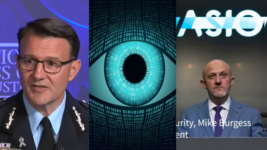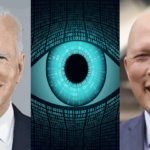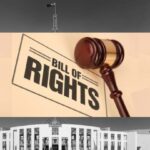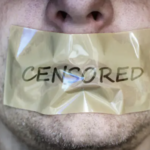Government Uses Stabbings and Terrorism Raids to Justify Crackdown on Free Speech

ASIO boss Mike Burges and AFP commissioner Reece Kershaw appeared at the National Press Club on Wednesday, to stress the need for a crackdown on internet freedoms in the wake of recent Sydney stabbings and raids, although these events had no direct bearing on what was discussed.
Laws to curb web content were actually drafted long ago, with a bill containing them soon-to-be tabled in parliament. And while the policy to clampdown online is nothing new, it has been given renewed vigour as the internet has been abuzz with unofficial and unapproved truths about Gaza.
Similar matters are playing out in the US, as the Biden administration attempts to ban social media app Tik Tok, as it’s been a major source for seeking visual truths about the Israel-perpetrated genocide in Gaza at present, which, conservatively, has seen about 35,000 innocent people killed.
To consider that politicians might take advantage of recent Sydney incidents that further involved a mass murder by a white Australian in a mall in order to progress a policy initiative, which is too being proposed by other Five Eyes administrations, does seem a bit nasty.
But the current situation involving a 14-year-old Muslim boy being remanded as a suspected terrorist is a little on the nose as well.
In fact, one can imagine that with Wednesday’s NSW terrorism raids underway a collective “bingo” emanated within the minds of top ASIO spies, as the excuse to advance on this policy position had presented itself, just as the new laws are about to be introduced and debated.
Spooks spooking the public
ASIO director general Burgess reignited the war on encryption on Wednesday, which former PM Malcolm Turnbull and then attorney general George Brandis first flagged in July 2017, after a recent Five Eyes alliance communique had suggested busting encryption was on the agenda.
The Five Eyes is a data sharing security alliance between the US, the UK, Canada, NZ and Australia. And encryption is a type of computer coding that allows end-to-end private messaging without the ability for others to make sense of such data. And Burgess claims crooks are hiding behind this.
The ASIO boss provided two examples which revealed that this week’s Sydney terror raids aren’t really what triggered the encryption war, as the first example cited regarding why intelligence needs access beyond the wall of encryption was some white supremacists plotting a race war.
And the second example provided as to why government should be able to access encrypted messages was, again, nothing to do with the recent raids, but rather it involved some other individual accessing material, who was also allegedly in contact with the Islamic State overseas.
ASIO “feared they were encouraging him to conduct a terrorist attack, but we did not know for sure because he was using encrypted communications,” said Burgess.
Although he added that ASIO did crack the case, and he then insisted that this might lead some people in the community to consider this is reason to consider that the laws are working well at present, but he “believes it means the opposite”.
“Having lawfully targeted access to extremist communications would be more effective and efficient,” the ASIO boss suggested. “It would give us a real time view of their activities. I believe technology should not be above the rule of law.”
“Encryption, the companies implementing it and the individuals using it, should be responsible and accountable,” the top spy added.
Of course, what’s further being implied here is a situation whereby the enhanced abilities to communicate both privately and publicly, via the web and social media, regular people now have is problematic for authorities as they can’t control the narrative in general, not just during crises.
Red herrings
The ASIO boss addressed the private sector asking it to step up, given the heightened security concerns of the present moment, which the authorities appear to be escalating with their responses to the two Sydney stabbing events.
One of these responses, the Sydney terrorism raids, have resulted in the arrest of five “juveniles” who were subsequently charged with terrorism offences and remanded in custody. These Muslim boys are aged from 14 to 17 and none of them has committed or attempted to commit any violent act, yet they’re facing decades in gaol.
“I’m calling on Big Tech to establish lawful access solutions that can be applied in very tightly controlled and targeted situations, not to create backdoors or systemic weaknesses that break the internet,” said Burgess, just as Turnbull, Brandis and later, Peter Dutton have all suggested before.
“If the threat, evidence, safeguards and oversight are strong enough to obtain a warrant, they should be strong enough for the companies to give effect to that warrant,” the top spy said, as he hinted at a 2018 encryption-busting warrant scheme enacted by then home affairs minister Dutton.
The now opposition leader inserted part 15 into the Telecommunications Act 1997 (Cth) to permit government access to messages hidden by encryption, via a three-tier warrant scheme, which starts with a request and ends with an order to build capability access or be fined up to a $10 million.
Burgess stressed, he was in no way suggesting that government undertake a law drafting bonanza, but rather he extended an invitation to Big Tech to comply with such warrants to allow authorities to break through encryption for the good of the community.
Not quite universal jurisdiction
The stabbing of a Christian priest by a Muslim boy was livestreamed globally and footage of it had appeared in posts on X Corp and Meta platforms.
So, eSafety commissioner Julie Inman Grant last week issued an injunction to both social media companies, ordering them to take down the content. However, Elon Musk’s X refused to remove it.
This injunction was issued as the footage was deemed class 1 material, due to its graphic content, which means it would receive no classification from the National Classification Scheme, and it required the taking down of it, under the removal notice scheme of the Online Safety Act 2021 (Cth).
But Musk continues to refuse the order, as he’s arguing that the Australian courts don’t have jurisdiction to issue orders that apply to the entire planet. And the online safety laws were enacted in the aftermath of the 2019 Christchurch massacre that was livestreamed and then posted online.
Section 111 of the Online Safety Act permits the eSafety commissioner to issue a removal notice to a social media service in relation to class 1 material, which must result in the removal of any content within 24 hours. And a civil penalty of up to a $782,500 fine can be applied per contravention.
However, the attention the top cop and chief spy gave to this issue was minimal, and the main call was for social media companies to facilitate encryption busting warrants.
Reclaiming the narrative
But while Burgess repeatedly stressed that he and Kershaw were not calling for more laws, that’s likely because a set of mis- and dis-information laws, which target nongovernment and nonmainstream media online entities publishing materials that don’t comply, are soon to be tabled.
The stabbings that sparked the crackdown happened in NSW, and it was premier Chris Minns who foreshadowed this enhanced campaign, when he told 7.30 on 16 April that social media companies weren’t acting responsibly, and he’d be working with the Commonwealth regarding tougher laws.
PM Anthony Albanese continued to propagate the social media scare on 19 April, when he suggested to reporters that social media companies that make a lot of money out of their business have a social responsibility and, obviously, something has to be done about them.
The laws, which are similar to those being progressed in other Five Eyes nations, were published in the draft exposure of the Communications Legislation Amendment (Combatting Misinformation and Disinformation) Bill 2023 mid-last year.
The misinformation legislation, which is a bipartisan project, would empower the Australian Communications and Media Authority to approach nonmainstream and nongovernment digital platforms that it considers might be propagating fake news to ensure they don’t.
If ACMA considers one section of the digital platform services industry is presenting suspect versions of the truth, it can direct that sector to create an online code, which if not adhered to, can then be replaced by government developed industry standards. And two new offences would apply.
Noncompliance with an industry developed code could result in a maximum fine of $3.13 million or 2 percent of the offending corporation’s global turnover. However, noncompliance with an industry standard would carry a $7.825 million fine or 5 percent of turnover.
The narrative has flown the coop
The Coalition first spruiked such laws back in March 2022. The laws target nongovernment and nonmainstream entities on the web, which would include social media companies, alternative media and other civil society entities.
So, the inference is that government and mainstream media information can be trusted.
Yet, this has been thoroughly discounted since Israel launched its genocidal project upon the Palestinians of Gaza last October, as despite the online evidence of multiple and increasing crimes against humanity, western authorities have denied these crimes are taking place.
The NSW government, the Australian government and governments supportive of Israel’s military assault upon Gaza, have been overwhelmed by grassroots domestic pro-Palestinian mass demonstrations directly contravening official narratives due to the dissemination of truths online.
And as US officials attempt to suppress real footage of what’s transpiring in Gaza shared online, the Australian government is too attempting to deal with this current crisis, which has even discredited the Australian Broadcasting Corporation, due its own biased reporting on Israel’s colonising project.
So, the majors are rushing to see the mis- and dis-information laws enacted to counter information shared online that doesn’t conform to government official narratives.
And a clear example that is occurring at present has been the widespread rejection of Labor’s “Israel is defending itself” line.
Indeed, the fallout from Gaza has clearly revealed the differing narratives operating on the ground, and government is now urgently attempting to sweep up the understandings recently exposed by the catastrophe in Palestine.
However, such understandings are hard to capture once set loose.







